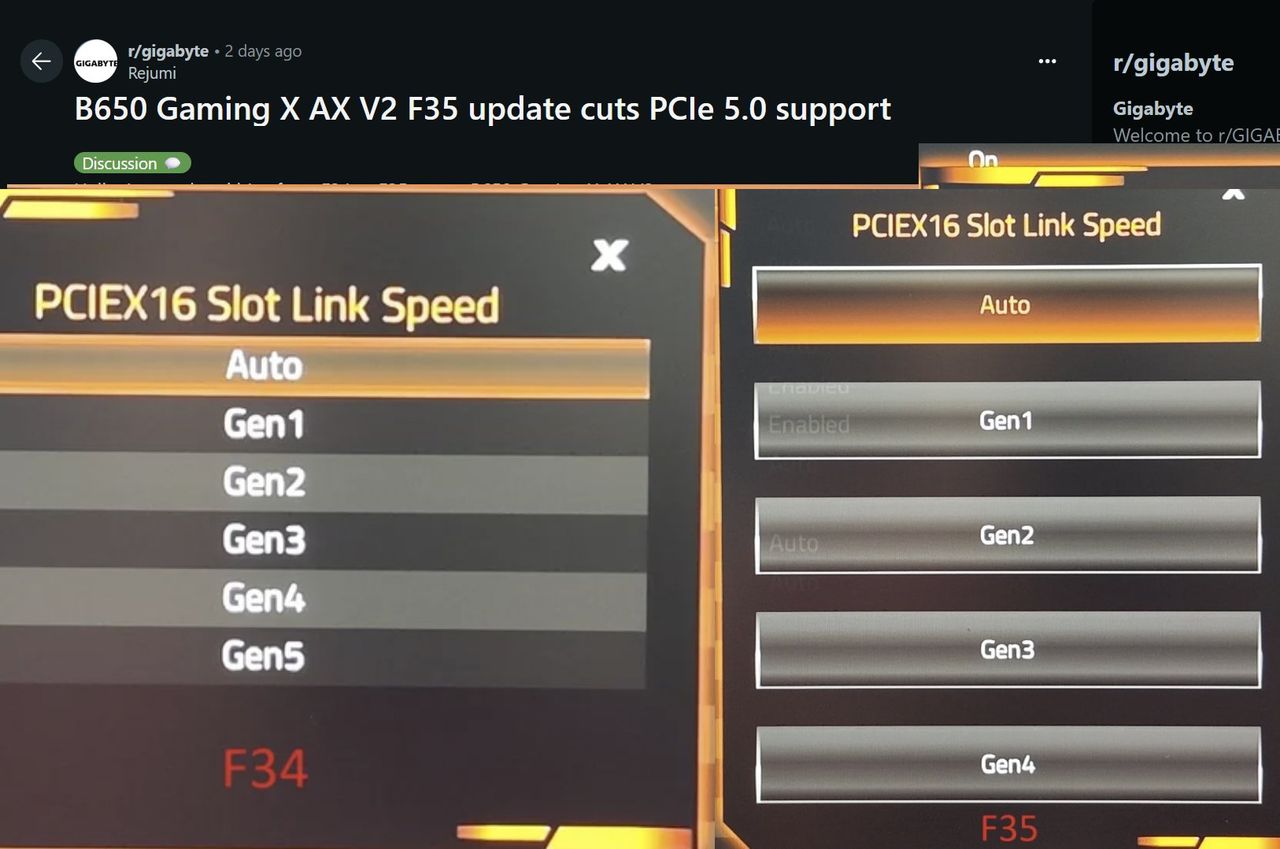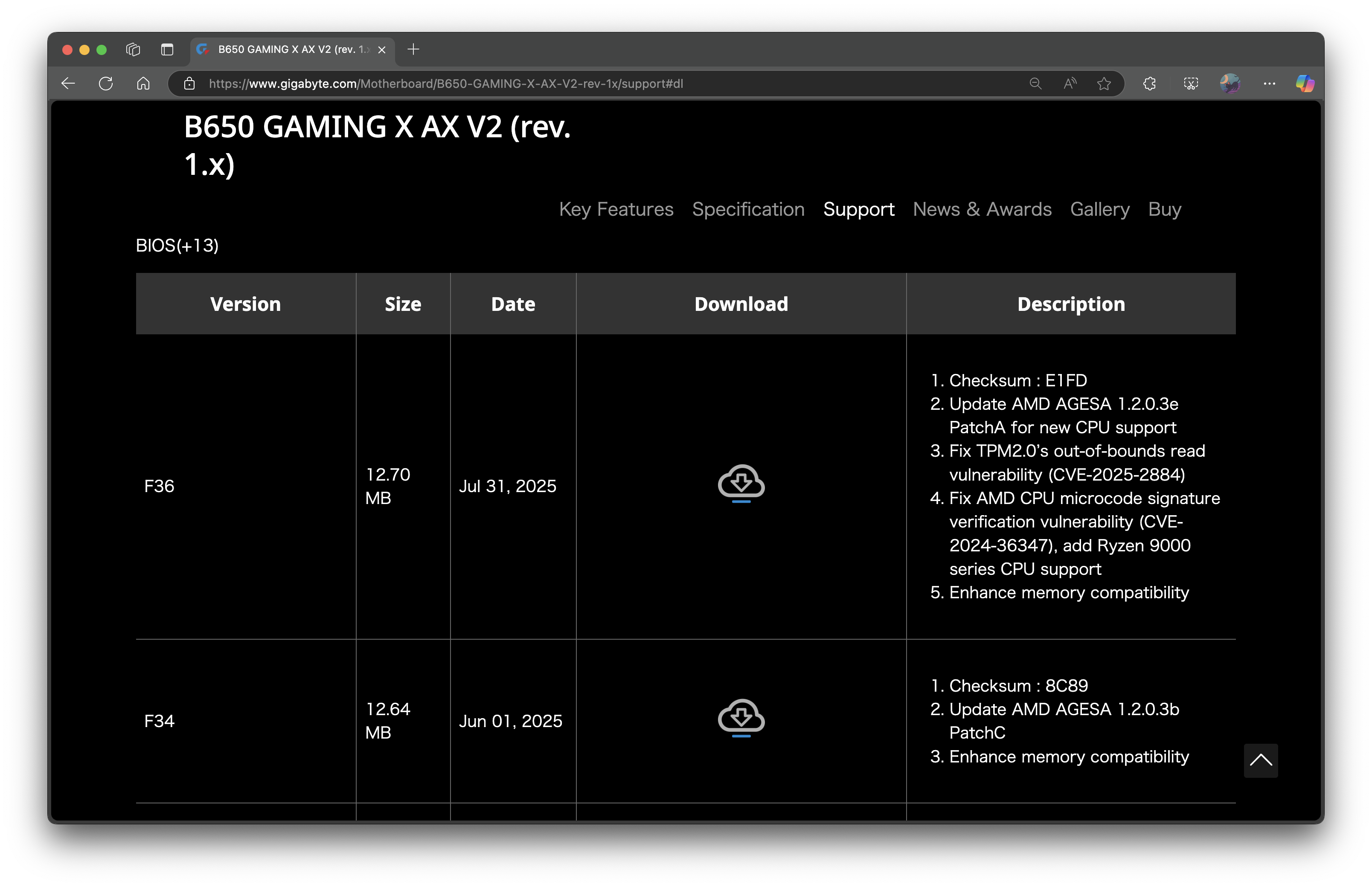
Gigabyte has quietly removed an unofficial PCIe 5.0 option from its B650 motherboards with the latest BIOS updates. The change has sparked significant furor among enthusiasts who noticed the tweak after flashing their boards. This only affects the PCIe x16 slot reserved for GPUs, and not the x4 M.2 slots that Gen5 SSDs would use.
According to reports on Reddit and Chiphell, the removal first occurred in BIOS version F35 for models like the B650 Gaming X AX V2. Users who previously saw a “Gen 5” setting for the primary PCIe x16 slot in BIOS now found the option missing entirely, with link speeds capped at PCIe 4.0. Rolling back to BIOS F34 brings PCIe 5.0 support back, confirming this was a BIOS functionality change.
B650 Gaming X AX V2 F35 update cuts PCIe 5.0 support from r/gigabyte
Interestingly, Gigabyte never officially advertised PCIe 5.0 support for B650 motherboards. AMD’s specifications clearly limit full PCIe 5.0 capability to the B650E and X670E chipsets. However, because some B650 boards share PCB layouts with their “E” counterparts, the feature remained accessible—at least until now. Moreover, B650 boards do have 4x PCIe Gen5 lanes meant to serve an SSD but not enough for an actual Gen5 GPU.
So, why remove it? According to folks on Chiphell, enabling Gen 5 on B650 boards was causing stability issues for some GPUs. An MSI insider known as “Hugable Carrot” even suggested that other vendors may follow Gigabyte’s lead, calling PCIe Gen 5 graphics cards “too troublesome” on these mid-tier chipsets.
more user reports on gigabyte new bios that removed the support of gen5x16 from its b650 lineup.msi insider Hugable carrot (可以抱的萝卜) on chiphell claimed more vendors would follow this trend. the gen5 cards are just too troublesome.to be fair it seems gigabyte has never… pic.twitter.com/j2qIGphPcDAugust 2, 2025
However, the removal of this PCIe x16 slot feature wasn’t listed in Gigabyte’s BIOS changelog, and this lack of transparency has drawn criticism. The same Reddit user, who first reported this change, also shared benchmarks in his post showing a slight performance drop after updating to F35—losing 15 points in Steel Nomad and 3–5 FPS in games like Cyberpunk 2077 and Dying Light 2. While PCIe 4.0 x16 is more than enough for modern GPUs, issues can arise when bandwidth is halved to x8, which can significantly impact performance on low-end cards like the RTX 5060 Ti.
For now, Gigabyte has already pulled BIOS F35 from its support page and replaced it with F36, which likely keeps the PCIe 5.0 option disabled. If you value that Gen 5 toggle—even if it offered no real-world gains for most people—staying on F34 might be your best bet.

As highlighted by others, removing PCIe 5.0 from B650 boards likely comes down to stability and compliance. PCIe Gen 5 signals require stricter PCB design and higher-quality components to maintain integrity, which B650 boards weren’t officially validated for. Allowing users to enable Gen 5 could lead to unpredictable behavior, RMAs, and compatibility headaches—issues Gigabyte (and AMD) want to avoid.
The bigger question is whether this sets a trend. If that MSI insider is correct, more vendors could start locking down “hidden” Gen 5 support on mid-range boards, reinforcing AMD’s segmentation between B650, B650E, and X670E chipsets.
Follow Tom's Hardware on Google News to get our up-to-date news, analysis, and reviews in your feeds. Make sure to click the Follow button.







